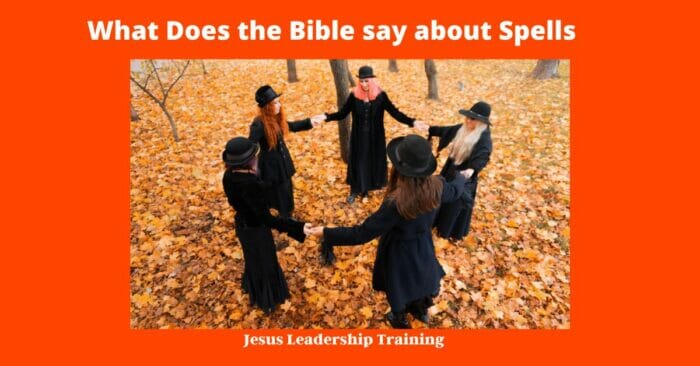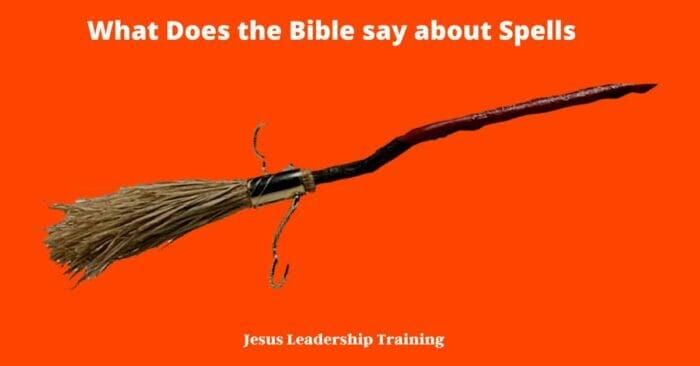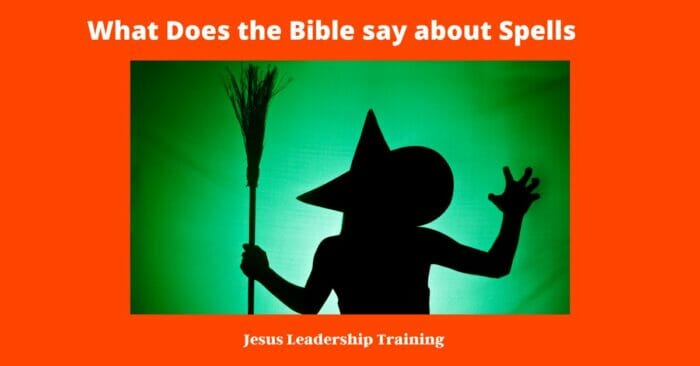What Does the Bible say about Spells – The Bible is clear that using spells for any purpose is wrong and forbidden. According to Deuteronomy 18:10-12, God forbids His people from practicing divination, sorcery, or casting spells of any kind. These acts are an abomination to Him and will bring His wrath and judgment.
In the New Testament, Galatians 5:19-21 lists sorcery as one of the works of the flesh and warns that those who practice such things will not inherit the kingdom of God. Furthermore, Ephesians 5:11 declares that God’s people should not take part in any activities that involve darkness, such as spells and occult practices. Therefore, the Bible clearly states that spells and other occult activities are prohibited and should be avoided.
Table of Contents
What Does the Bible say about Spells
The Bible is filled with stories, teachings and instructions on many topics, including spells and witchcraft. There is much debate about what the Bible says about spells, and it can be difficult to interpret its meaning. To help clear up any confusion, this blog post will take a look at what the Bible says about spells, from defining what a spell is to determining where one can find verses on spells in the Bible.
How Does the Bible Define Spells?
The Bible does not provide a single definition of a spell, but instead uses a variety of words and phrases to describe it. In the Old Testament, the Hebrew word m’chashefah is often translated as “spells” or “enchantments.” The New Testament uses the Greek term pharmakeia, referring to the use of drugs, potions and spells. In general, the Bible views spells as activities that use occult or supernatural powers, often in an attempt to manipulate people or events.

List of Sins Related to Witchcraft
- Blasphemy: Blasphemy is the act of speaking disrespectfully about God or about religious ideas and beliefs. In some cases, it can also refer to the use of magical powers to challenge or mock the power of the divine.
- Divination: Divination is the practice of attempting to foretell the future or gain insight into a situation by using supernatural means such as tarot cards, runes, or astrology. It is considered a sin in many religious traditions.
- Conjuring Demons: Conjuring demons is the practice of summoning and making deals with evil spirits and other entities. This is seen as a form of dark magic and is widely considered a sin in many religious traditions.
- Animal Sacrifice: Animal sacrifice is the ritual killing of animals for religious or magical purposes. This type of ritual is widely condemned in many religious traditions and is considered a sin.
- Spell Casting: Spell casting is the practice of using magic to bring about desired outcomes. This type of magic is seen as a form of manipulation and is considered a sin in many religious traditions.
- Necromancy: Necromancy is the practice of using magic to communicate with and control the dead. This type of magic is seen as a form of manipulation and is considered a sin in many religious traditions.
- Curse Casting: Curse casting is the practice of using magic to bring harm to another person or their family. This type of magic is seen as a form of manipulation and is considered a sin in many religious traditions.
- Hexing: Hexing is the practice of using magic to bring harm to another person or their family. This type of magic is seen as a form of manipulation and is considered a sin in many religious traditions.
- Rituals and Spells: Rituals and spells are the practice of using magical rituals to bring about desired outcomes. This type of magic is seen as a form of manipulation and is considered a sin in many religious traditions.
- Black Magic: Black magic is the practice of using dark magic for evil or selfish purposes. This type of magic is seen as a form of manipulation and is considered a sin in many religious traditions.
Witches Listed in the Bible, verse with Description
- Witch of Endor (1 Samuel 28:7-25): A powerful witch from the town of Endor who was visited by Saul in order to seek guidance from the spirit of the prophet Samuel.
- Simon the Sorcerer (Acts 8:9-24): A sorcerer living in Samaria who practiced magical arts and sought to buy the gift of the Holy Spirit from the apostle Peter.
- The Witch of En-Dor (2 Kings 21:1-6): A woman who consulted with the spirit of the dead in order to predict the future.
- Jambres (2 Timothy 3:8): A sorcerer and magician who opposed Moses and Aaron in Egypt.
- The Witch of Endor (1 Chronicles 10:13-14): A woman who was consulted by Saul in order to gain advice on how to fight the Philistines.
- Pharaoh’s Magicians (Exodus 7:11-12): A group of magicians and sorcerers who were employed by Pharaoh to oppose Moses and Aaron and their miracles.
- Balaam (Numbers 22:6-24:25): A prophet who was hired by Balak to curse the Israelites, but was instead forced to bless them.
- Jezebel (1 Kings 21:1-16): A wicked queen who employed prophets of Baal and Asherah to lead the people of Israel away from the worship of God.
- The Witch of En-Gedi (2 Chronicles 33:1-7): A woman who was consulted by Manasseh in order to receive advice on how to become prosperous.
- The Magicians of Egypt (Exodus 7:11-12): A group of magicians and sorcerers who opposed Moses and Aaron in Egypt.

Etymology of the Biblical Name Spells, Incantations, Witchraft
The etymology of the biblical name spells, incantations, and witchcraft is a topic that has been debated for centuries. According to scholars, the earliest references to these practices can be found in the Bible and other ancient texts. Although the exact origin of these practices is unknown, it is believed that they were first used by ancient cultures to protect them from evil spirits and to seek divine assistance.
The term “spell” comes from the Latin root “spellare” which means “to read” or “to recite”. This term was used to describe the act of speaking or chanting words, usually in a ritualistic manner, in order to invoke a supernatural power. This practice was often used in religious ceremonies, such as prayers and invocations, and in rituals of healing and protection.
The term “incantation” is derived from the Latin root “incantare” which means “to charm” or “to enchant”. This term was used to describe the act of speaking words, usually in a ritualistic manner, to invoke a supernatural power. This practice was often used in religious ceremonies, such as prayers and invocations, and in rituals of healing and protection.

The term “witchcraft” has its roots in the Old English word “wicce” which means “wise woman” or “witch”. This term was used to describe the practice of using supernatural powers or magic for the purpose of healing, protecting, or influencing people or events. This practice was often done through the use of spells, incantations, and rituals.
In the Bible, the first references to these practices can be found in the book of Exodus. In this book, the Israelites were instructed to use incantations and prayers to ward off evil spirits. They were also told to use herbs and other materials to create magical charms and amulets in order to protect them from harm. In addition, the Israelites were instructed to use divination to interpret the will of God and to distinguish between good and evil.
Throughout history, the practice of spellcasting, incantations, and witchcraft has been used for both good and evil purposes. In the Middle Ages, it was believed that witches had the power to influence the weather, influence people’s emotions, and even curse people. This led to the persecution of many people who were accused of practicing witchcraft.
Today, the etymology of the biblical name spells, incantations, and witchcraft are still shrouded in mystery. Although there is still much debate over the exact origin of these practices, it is clear that they have been used for centuries for both good and bad purposes. Whether for protection, healing, or influencing people and events, the etymology of these biblical name spells, incantations, and witchcraft are still a fascinating topic.
History of Witcraft
Witchcraft is an ancient practice that has been around for centuries. Its origin is largely unknown, as it has been practiced in various forms in different cultures throughout history. It is believed that the practice of witchcraft dates back to prehistoric times, when shamans and medicine men used their knowledge of the natural world to heal people, communicate with spirits, and manipulate the forces of nature.
In the ancient world, witchcraft was seen as a way to gain power and influence over others. It was used to influence political decisions, gain favor with the gods, and even to cast spells of love and protection. In some cultures, it was believed that witches could make predictions about the future and even control the weather.
In medieval Europe, witchcraft was seen as an evil and dangerous practice. People believed that witches could summon demons, cause sickness and misfortune, and even kill people. Witch hunts were common during this period, with many innocent people being persecuted and executed on the basis of hearsay and superstition.
In the modern world, witchcraft has taken on a different form. It is no longer seen as a dark and dangerous practice, but rather as a way to connect with nature and to use its power for good. Many people practice witchcraft for spiritual growth and to gain a deeper understanding of the natural world.
Wicca, a modern form of witchcraft, has gained popularity in recent years. Wiccans believe in the power of the natural world and use it to create positive change in their lives. They practice rituals and spells to bring about healing, abundance, and protection.
Although the practice of witchcraft has changed over time, its power and influence remain. Witches have been able to use their knowledge and understanding of the natural world to bring about positive change in their lives and the lives of others. Witchcraft is a practice that has been around for centuries, and its history is still being explored and understood.
When Are Spells Forbidden in the Bible?
The Bible is clear that spells are forbidden, particularly when they are used to manipulate or control another individual. In Deuteronomy 18:9-12, God instructs the Israelites not to practice divination, sorcery, black magic, astrology, or any type of spell. In Leviticus 20:27, God says that anyone who practices these activities is to be put to death.
Where Can We Find Verses on Spells in the Bible?
Verses on spells can be found throughout the Bible, from the Old Testament to the New Testament. In the Old Testament, verses on spells can be found in Exodus 7:11, 2 Kings 21:6, and Isaiah 8:19. In the New Testament, verses on spells can be found in Acts 19:19, Galatians 5:20, and Revelation 21:8.
Does the Bible Condemn the Practice of Magic?
Yes, the Bible is clear that the practice of magic is forbidden. In Deuteronomy 18:10-12, God states that anyone who practices divination, sorcery, or any other form of spell is an abomination to Him. In Acts 8:9-11, the Bible condemns the practice of sorcery and magic, stating that anyone who practices such activities should not be allowed to remain in the church.
What Does God Say About Witches and Witchcraft?
The Bible is very clear in its condemnation of witches and witchcraft. In Deuteronomy 18:10-12, God states that anyone who practices divination, sorcery, or any other form of spell is an abomination to Him. In Exodus 22:18, God commands that all witches should be put to death. In Galatians 5:20, those who practice witchcraft are listed among those who will not inherit the kingdom of God.
Relationship of Satan, Devils, Demons With Witchcraft
Throughout history, the Bible has been used to reference the relationship between Satan, devils, demons, and witchcraft. In the Old Testament, we see numerous references to witchcraft and its associated demonic powers. In Leviticus 19:31, God warns His people not to practice the “abomination” of witchcraft. He also warned them not to consult “familiar spirits” or “wizards” (Deuteronomy 18:10-12). In the New Testament, we see Jesus confronting the devil and his demons, who were responsible for the spread of witchcraft.
The Bible speaks of Satan’s role in witchcraft. In Revelation 12:9, we see him described as the “accuser of the brethren,” who accuses God’s people before God. In 2 Corinthians 4:4, we are told that Satan is the “god of this age,” and he has the power to deceive people into believing falsehoods, such as that of witchcraft. In Ephesians 6:12, we see that Satan and his demons are behind the schemes of the wicked, which includes witchcraft.
The Bible also speaks of devils and demons. In Matthew 8:29, we see a legion of demons recognizing Jesus as the “Son of God,” a title that only God can give. In Luke 10:17-20, Jesus gives His disciples authority over “all the power of the enemy,” which includes devils and demons. As such, Jesus has given His followers the authority to overcome the spiritual forces of darkness associated with witchcraft.
Finally, the Bible speaks of the relationship between witches and their demonic masters. In Isaiah 8:19-20, we see a witch consulting her familiar spirits for advice. In Acts 16:16, we read about a fortune-telling slave girl being possessed by a spirit. In both cases, the witches were in direct contact with demonic forces.
In conclusion, the Bible has numerous references to the relationship between Satan, devils, demons, and witchcraft. This relationship is one of power and control, with Satan and his minions seeking to deceive and manipulate people into believing in and practicing the occult arts. However, through the power of Jesus Christ and the authority He has given us, we have the power to overcome these spiritual forces and live in freedom from their influence.
What Bible Verses Are Relevant to Spells?
Many Bible verses are relevant to spells, from the Old Testament to the New Testament. In Exodus 7:11, God instructs Moses to confront Pharaoh’s magicians. In 2 Kings 21:6, God condemns all forms of witchcraft and sorcery. In Isaiah 8:19, God commands the people to not seek the advice of those who practice black magic. In Galatians 5:20, those who practice witchcraft are listed among those who will not inherit the kingdom of God.
How Does the Old Testament Describe Spells?
The Old Testament uses several descriptions of spells, including “enchantment” (Leviticus 19:26), “witchcraft” (Exodus 22:18) and “divination” (Deuteronomy 18:10-12). In general, the Old Testament views spells as activities that use occult or supernatural powers, often in an attempt to manipulate people or events.
What Does the New Testament Say About Spells?
The New Testament also condemns the practice of spells and witchcraft. In Acts 8:9-11, the Bible states that anyone who practices sorcery or magic should not be allowed to remain in the church. In Galatians 5:20, those who practice witchcraft are listed among those who will not inherit the kingdom of God. In Revelation 21:8, anyone who practices sorcery or witchcraft is condemned to the lake of fire.
What Does the Bible Teach About Avoidance of Spells?
The Bible teaches that we should avoid spells at all costs. In Deuteronomy 18:10-12, God states that anyone who practices divination, sorcery, or any other form of spell is an abomination to Him. Additionally, in 1 Corinthians 10:20-21, Paul warns us to avoid all forms of idolatry, including the practice of spells.
What Are the Dangers of Spells According to the Bible?
The Bible is clear that spells are dangerous, as they can lead to spiritual and physical harm. In Deuteronomy 18:10-12, God states that anyone who practices divination, sorcery, or any other form of spell is an abomination to Him. Additionally, in 1 Timothy 4:1, Paul warns us that those who practice sorcery will be condemned.
What Bible Verses Provide Guidance on the Prevention of Spells?
The Bible provides several verses that provide guidance on the prevention of spells. In Deuteronomy 18:10-12, God states that anyone who practices divination, sorcery, or any other form of spell is an abomination to Him. In Exodus 22:18, God commands that all witches should be put to death. Additionally, in Galatians 5:20, those who practice witchcraft are listed among those who will not inherit the kingdom of God.
What Does the Bible Say About Spells and Divination?
The Bible is very clear in its condemnation of spells and divination. In Deuteronomy 18:10-12, God states that anyone who practices divination, sorcery, or any other form of spell is an abomination to Him. Additionally, in Leviticus 19:26, God commands the people to not practice any form of divination or sorcery.
How Does the Bible Describe the Use of Spells and Enchantment?
The Bible describes the use of spells and enchantment in a variety of ways. In Deuteronomy 18:10-12, God states that anyone who practices divination, sorcery, or any other form of spell is an abomination to Him. In Isaiah 8:19, God commands the people to not seek the advice of those who practice black magic. In Galatians 5:20, those who practice witchcraft are listed among those who will not inherit the kingdom of God.
What Are the Negative Consequences of Spells According to the Bible?
The Bible is clear that spells can lead to spiritual and physical harm. In Deuteronomy 18:10-12, God states that anyone who practices divination, sorcery, or any other form of spell is an abomination to Him. Additionally, in 1 Timothy 4:1, Paul warns us that those who practice sorcery will be condemned.
- Divination and Witchcraft are Forbidden: Divination and witchcraft are strictly forbidden in the Bible. In Deuteronomy 18:10-12 it states, “Let no one be found among you who sacrifices their son or daughter in the fire, who practices divination or sorcery, interprets omens, engages in witchcraft, or casts spells, or who is a medium or spiritist or who consults the dead. Anyone who does these things is detestable to the Lord.” This passage is clear in its prohibition of divination and witchcraft, stating that anyone who practices these activities is detestable to the Lord.
- Rejection of God: Practicing divination and witchcraft is a rejection of the power and authority of God. When people turn to divination and witchcraft they are not trusting in God and His will, but rather in the power of the spirit world. In Isaiah 8:19 it states, “When men tell you to consult mediums and spiritists, who whisper and mutter, should not a people inquire of their God? Why consult the dead on behalf of the living?” This passage shows that God desires for people to seek Him and His will, rather than consulting the dead or the spirit world.
- Spiritual Deception: Divination and witchcraft can open people up to spiritual deception, which can be dangerous. In Isaiah 19:3 it states, “The spirit of the Egyptians within them will become weak; I will confuse their plans and they will consult the idols and the spirits of the dead.” This passage shows that divination and witchcraft can open people up to spiritual deception, as they will seek guidance from false sources.
- Idolatry: Divination and witchcraft are often associated with idolatry and worship of false gods. In Leviticus 19:31 it states, “Do not turn to mediums or seek out spiritists, for you will be defiled by them. I am the Lord your God.” This passage shows that divination and witchcraft can lead to idolatry, as people will seek guidance from false sources.
- Separation from God: Practicing divination and witchcraft can lead to separation from God and alienation from His people. In Deuteronomy 18:13 it states, “Anyone who has a medium or spiritist among you must be put to death. You are to stone them; their blood will be on their own heads.” This passage shows that those who practice divination and witchcraft will be separated from God and His people.
What Are the Spiritual Implications of Spells in the Bible?
The Bible is clear that spells have serious spiritual implications. In Deuteronomy 18:10-12, God states that anyone who practices divination, sorcery, or any other form of spell is an abomination to Him. Additionally, in 1 Corinthians 10:20-21, Paul warns us to avoid all forms of idolatry, including the practice of spells.
Final Thoughts – What does the Bible Say about Spells
The Bible is clear in its stance on spells: they are forbidden. In Deuteronomy 18:10-12, God states that anyone who practices divination, sorcery, or any other form of spell is an abomination to Him. Additionally, in Galatians 5:20, those who practice witchcraft are listed among those who will not inherit the kingdom of God. The Bible also provides guidance on prevention of spells and the negative consequences of practicing them, making it clear that they are to be avoided.
God Bless Greg




